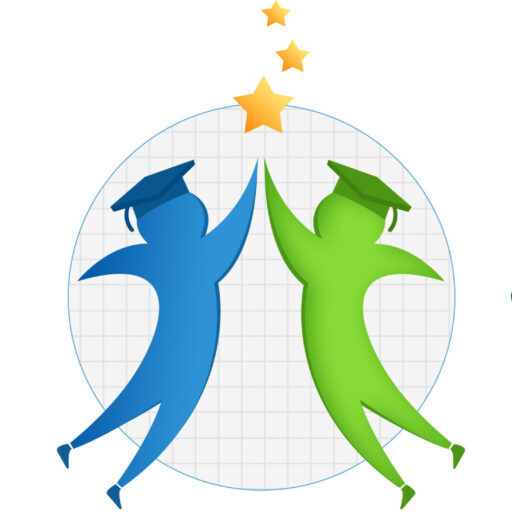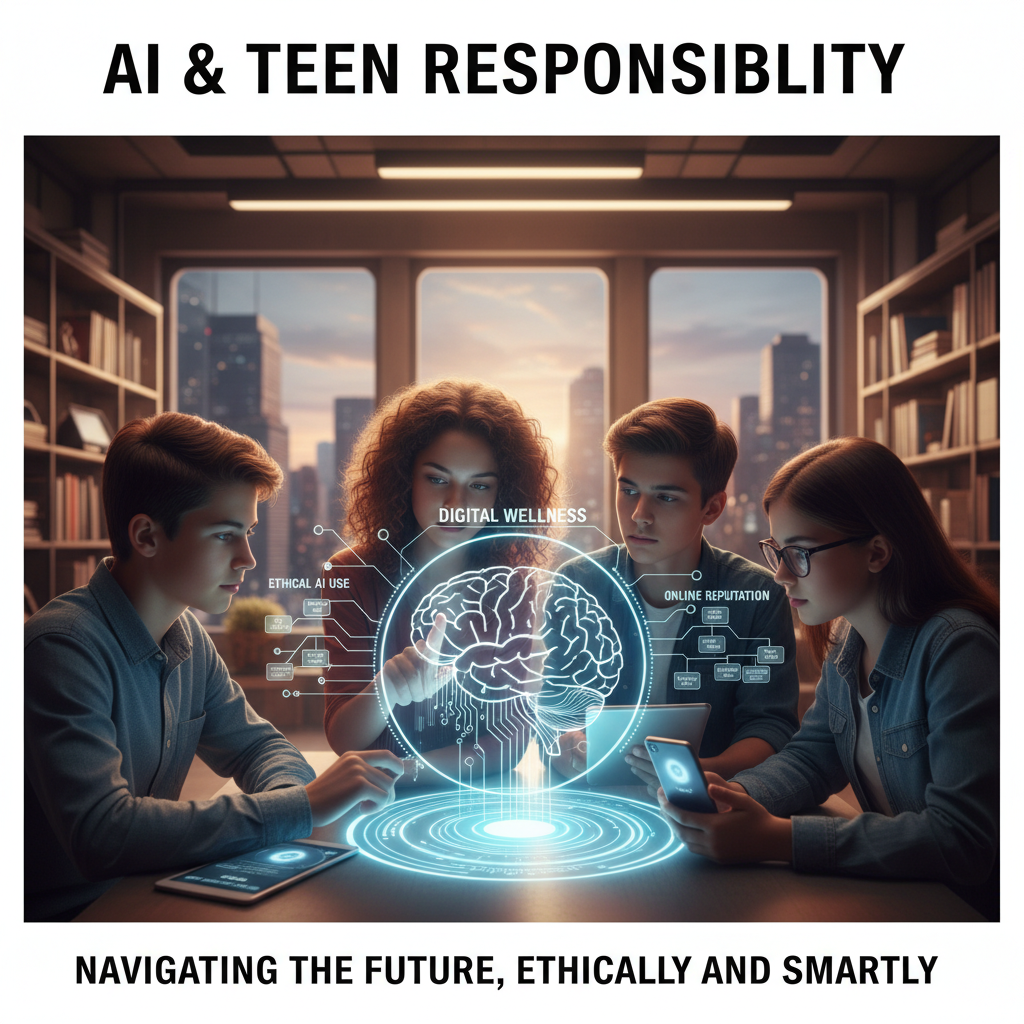AI and Teen responsibility is no longer a futuristic concern—Artificial Intelligence (AI) is already part of everyday life. From personalized recommendations on YouTube and Netflix to AI-powered study apps and even creative tools for music and art, today’s teens are growing up in a world where AI plays a major role.
But with these opportunities come responsibilities. How teens use AI today will shape not only their personal growth but also the way technology evolves in the future. That’s why it’s so important to understand how to make smart, ethical, and responsible choices when using AI in the digital age.
This blog will explore how AI and Teen interactions can bring incredible benefits while also requiring mindfulness of risks—and how young people can strike the right balance between innovation and responsibility.
Table of Contents
ToggleWhy AI Matters for Teens
AI is like a double-edged sword—it can empower teens to learn faster, think more creatively, and explore new opportunities. At the same time, over-reliance on it or careless use can lead to problems like misinformation, lack of originality, or even privacy risks.
Here are a few key reasons why AI matters for today’s teens:
Education Support – AI study apps can summarize lessons, explain concepts, and help with homework.
Creativity Boost – Teens can use AI to write stories, generate art, or compose music.
Career Preparation – Knowing how AI works today gives teens a head start for future jobs.
Personal Growth – AI can provide insights into mental health, productivity, and self-improvement.
But just like with any powerful tool, the way it’s used makes all the difference.
Smart Choices Teens Can Make with AI
1. Use AI as a Learning Partner, Not a Shortcut
It’s tempting to let AI write essays or solve math problems instantly. But the smarter choice is to use AI as a study partner—ask it for explanations, practice problems, or examples rather than copying answers. This builds real understanding and prevents dependency.
2. Balance AI with Human Creativity
AI can generate poems, paintings, and even full songs. While that’s exciting, true creativity comes from combining human imagination with AI assistance. Teens should use AI for brainstorming or enhancing ideas rather than replacing their unique voice.
3. Be Aware of Privacy and Safety
Many AI tools collect data. Teens should avoid sharing personal details, sensitive photos, or private information. A simple rule is: if you wouldn’t tell a stranger, don’t tell an AI tool.
4. Fact-Check Everything
AI sometimes makes mistakes—it can confidently present false information. That’s why teens need to double-check answers with trusted sources like books, teachers, or verified websites before relying on AI responses.
5. Practice Digital Balance
Spending too much time on AI chatbots or games can reduce real-world social skills. Teens should balance digital use with hobbies, friendships, and family time.
6. Think About Ethics
Using AI responsibly means asking questions like:
“Am I being honest?”
“Am I using AI in a way that benefits me without harming others?”
“Would I be proud if someone knew how I used AI?”
These small reflections help build a strong sense of digital ethics.2’4

How Parents and Teachers Can Guide Teens
Teens don’t have to navigate this digital world alone. Parents and teachers play a vital role in shaping responsible AI use. Here are a few ways they can help:
Open Conversations – Instead of banning AI tools, discuss how they can be used responsibly.
Set Boundaries – Encourage balance by setting limits on screen time.
Model Behavior – Adults who use AI responsibly set an example for teens to follow.
Provide Resources – Introduce safe AI platforms for learning and creativity.
The Future of AI and Teen Responsibility
The next generation will grow up side by side with AI. Future jobs, communication, and even healthcare will rely heavily on it. Teens who learn today to be responsible, ethical, and creative with AI will be better prepared for tomorrow.
Instead of being passive users, teens have the power to become leaders, innovators, and ethical voices in the AI revolution.
FAQs About AI and Teens Responsibility
Q1. Can teens use AI for schoolwork?
Yes, but it should be used as a helper, not a replacement. AI can explain concepts, create practice questions, or suggest ideas—but the actual learning should come from the teen.
Q2. What risks should teens watch out for when using AI?
Privacy issues, misinformation, over-reliance, and reduced creativity are the biggest risks. Being mindful helps avoid these pitfalls.
Q3. How can parents ensure their teens are using AI responsibly?
Parents can encourage open conversations, set healthy limits, and guide teens toward safe and educational AI platforms.
Q4. Will learning AI skills help teens in their careers?
Absolutely. AI literacy is already becoming a valuable skill in fields like technology, healthcare, finance, education, and entertainment. Teens who learn early gain a strong advantage.
Q5. Can AI affect mental health for teens?
Yes, if used excessively. Overuse can cause dependency or reduce real-life interactions. However, mindful use can actually support mental wellness through productivity apps, meditation tools, or journaling support
Final Thoughts- AI and Teens Go Hand in Hand
AI is here to stay, and for teens, it’s both an opportunity and a responsibility. By making smart choices—like using AI as a tool for growth, respecting privacy, and valuing human creativity—young users can shape a future where technology empowers, not controls, them.
The digital age calls for awareness, balance, and responsibility. Teens who understand this will not just survive in an AI-driven world—they’ll thrive. Teens need to become 10X AI Leaders for the Future—individuals who not only use AI wisely but also lead with vision, ethics, and innovation

